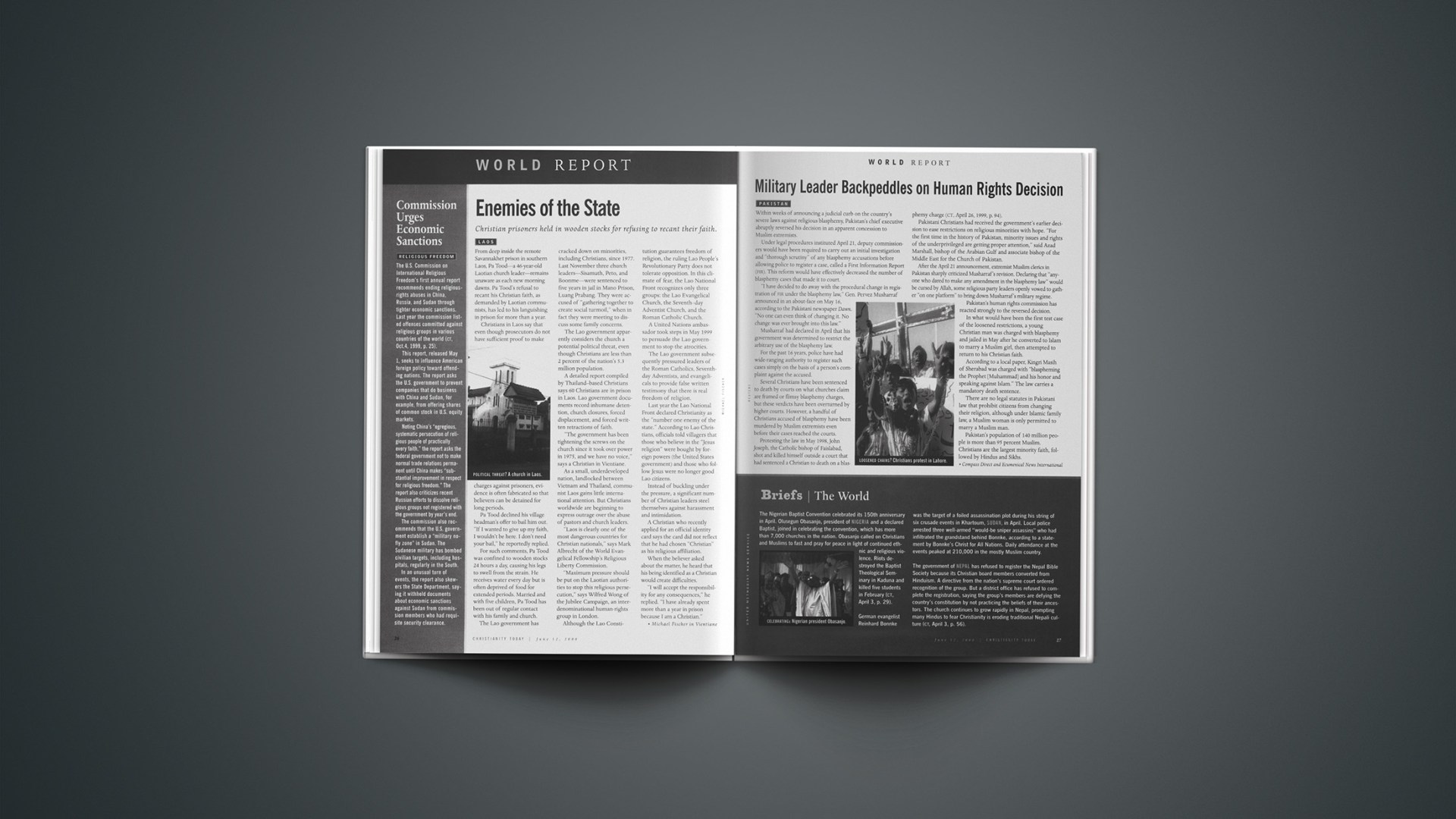As each new morning dawns in Laos, Pa Tood, a 46-year-old Laotian church leader, remains unaware of night or day, deep inside the remote Savannakhet prison in southern Laos. Pa Tood’s refusal to recant his Christian faith, as demanded by Laotian communists, led to his languishing in prison for more than a year.Christians in Laos say even though the courts do not have sufficient proof to make charges against prisoners, evidence is often fabricated so that believers can be detained in stocks for long periods.Pa Tood declined his village headman’s offer to bail him out. “if I wanted to give up my faith, I wouldn’t be here. I don’t need your bail,” he reportedly replied.For such comments, Pa Tood was confined to stocks 24 hours a day, causing his legs to swell from the strain. He receives water every day, but is often deprived of food for extended periods. Married and with five children, Pa Tood has been out of regular contact with his family and church.Since 1997 the Lao government has come down heavily on minorities, including Christians. Last November, three church leaders-Sisamuth, Peto, and Boonme-were sentenced to five years in jail in Mano Prison, Luang Prabang. They were accused of “gathering together to create social turmoil” when in fact, they were meeting to discuss some family concerns.In January 1998, 44 Christians were arrested at a Bible study in a private home. The last of the 44 were released in June 1999, after being held for 17 months.
Tightening the Screws
The Lao government apparently considers the church a potential political threat even though less than 2 percent of the population of 5.3 million people in Laos are Christians. A detailed report compiled by Thailand-based Christians says 60 Christians are in prison. Lao government documents show that there is inhumane detention, closure of churches, forced displacement, and forced written retractions of faith.One detainee is a Laotian Army captain, Khamtanh Phousy, who became a Christian in 1992 and has been in prison since 1996.
“The government has been tightening the screws on the church since it took over power in 1975, and we have no voice,” says a Christian in Vientiane. As a small, underdeveloped nation, landlocked between Vietnam and Thailand, Laos gains little international attention. But Christians worldwide are beginning to express outrage over the abuse of pastors and church leaders.” Laos is clearly one of the most dangerous countries for Christian nationals, ” says Mark Albrecht of the World Evangelical Fellowship’s Religious Liberty Commission.” Maximum pressure should be put on the Laotian authorities to stop this religious persecution,” says Wilfred Wong of the Jubilee Campaign, an interdenominational Christian human-rights group in London.
The Lao People’s Democratic Republic is an authoritarian, one-party state ruled by the Lao People’s Revolutionary Party (LPRP). The communists are still in control nearly 25 years after taking power on December 2, 1975, though their ideology has softened somewhat over time. Although the Lao Constitution guarantees freedom of religion, the LPRP does not tolerate opposition. Laos has at least 60 ethnic groups besides the Lao people, who make up only 50 percent of the population. Less than 2 percent of the populace is Christian. The population of ethnic Laos is nearly 90 percent Buddhist, and the communist party’s Department of Religious Affairs oversees all Buddhist practice and leadership.
Protest Squelched
In a rare public demonstration on October 26, students and teachers in the Lao capital of Vientiane began a peaceful protest. Police arrested 30 people, 10 of whom are still in detention. Police pressured the detainees to reveal any connection with the church. In this climate of fear, the National Front recognizes only three groups: the Lao Evangelical Church (which is the umbrella Protestant church), the Seventh-day Adventist Church, and the Roman Catholic Church. In May 1999, United Nations Educational and Scientific Organization Goodwill Ambassador Phan Thi Kim Phuc wrote to her chief, Fredrico Mayor, expressing concern that Christians were being unjustly treated in Laos. She urged Mayor to write to the Lao government to stop the atrocities. The Lao government subsequently pressured leaders of the Roman Catholic Church, the Seventh-day Adventists, and the Lao Evangelical Church to provide false written testimony that there is real freedom of religion.
Last year the Lao National Front declared Christianity as the “number one enemy of the state.” According to Lao Christians, officials told villagers that those who believe in the “Jesus religion” were bought by foreign powers (the United States government) and those who follow Jesus were no longer good Lao citizens. Instead of buckling under the pressure, a significant number of Christian leaders steel themselves against harassment and intimidation. A Christian who recently applied for an official identify card says the card did not reflect that he had chosen “Christian” as his religious affiliation. When the believer asked about the mistake, he heard that his being identified as a Christian would create difficulties.” I will accept the responsibility for any consequences,” he replied. “I have already spent more than a year in prison because I am a Christian.”
Related Elsewhere
Persecution watchdog groups International Christian Concern and Christian Solidarity Worldwide have regularly updated reports on Laos.The U.S. Department of State has recent reports on religious freedom and human rights in general. Both are available at the U.S. Commission on International Religious Freedom site.
Copyright © 2000 Christianity Today. Click for reprint information.










